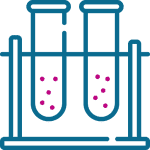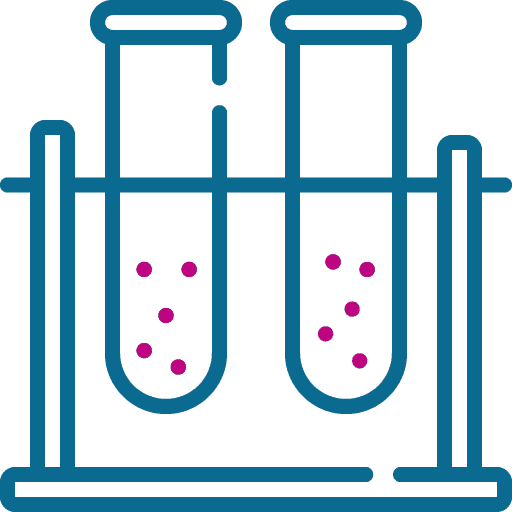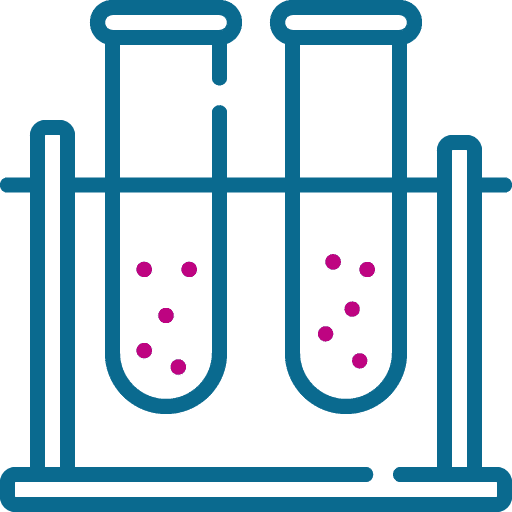Folic acid
It is used to detect disease in the following organs: liver, bone marrow, intestines, and to determine the cause of anaemia. Changes in red blood cells (erythrocytes) are also common.

What is folic acid?
Folic acid, also known as folate (a form of vitamin B9), is a B vitamin that is important for a wide range of bodily functions. It is not synthesised in the human body and must therefore be obtained from food.
Benefits of folic acid
Folic acid, together with vitamin B12, is needed for the formation of red blood cells in the bone marrow and for the use of iron in the body. Red blood cells, or erythrocytes, carry oxygen throughout the body. If the body does not make enough of them, megaloblastic anaemia can occur. It causes fatigue, weakness and a pale complexion.
Folic acid (vitamin B9) is essential for DNA and RNA synthesis, cell division and growth, and is a cofactor in many of the body’s biochemical reactions. It is particularly important for women during pregnancy, as it helps to prevent foetal malformations. Folate is needed for normal brain function, as well as mental and emotional health. It also stimulates appetite, gastric juice secretion and helps maintain a healthy liver.
Folic acid is also beneficial in reducing levels of homocysteine, a substance that promotes cholesterol deposition on blood vessel walls and contributes to cardiovascular disease. This helps to inhibit the accumulation of cholesterol in the heart muscle. Folic acid can therefore be used to prevent myocardial infarction. Studies have shown that it can help reduce the risk of cervical, bowel and lung cancers.
The benefits of folic acid are also associated with:
- Diabetes. Folic acid supplements can help improve blood sugar control, reduce insulin resistance and improve cardiovascular function in people with diabetes. Taking folic acid may also help reduce complications associated with the disease, including diabetic neuropathy.
- Fertility. Higher intakes of supplemental folic acid (more than 800 mg/day) are associated with higher live birth rates in women undergoing assisted reproduction. Sufficient levels of this vitamin are also essential for oocyte quality, attachment to the uterus and puberty.
- Ignition. Folic acid and its supplements have been shown to reduce inflammatory markers, including C-reactive protein (CRB).
Reducing the side effects of medicines. Folic acid supplements can help reduce the incidence of side effects associated with certain medicines (such as those used to treat rheumatoid arthritis, psoriasis and certain cancers).
And the list is not exhaustive.
Folic acid intake
Serum folic acid levels vary by age (and may also vary minimally by laboratory):
- 16-73 nmol/l for newborns;
- for adults – 6.1-36.5 nmol/l.
Folic acid reserves in the body are reflected in serum and erythrocyte levels. In anaemia, the erythrocyte test is considered more accurate as it allows you to assess processes in the bone marrow.
Recommended daily intake of folic acid:
- for children – 30-80 µg;
- adolescents – 150-200 µg;
- adults – 240 µg;
- 400 and 480 µg for pregnant and lactating women respectively.
Folic acid is needed more in people with intestinal diseases, epilepsy, alcoholism and drug addiction, liver disease, anaemia, and gastrointestinal disorders.
In exceptional cases, higher amounts of folic acid may be used, up to 4 mg daily (consult your doctor).
Symptoms of folic acid deficiency
Folic acid deficiency can be caused by:
- poor diet (insufficient vitamin B9 in the diet);
- alcoholism or certain drugs (e.g. phenytoin, trimethoprim, methotrexate);
- after bowel surgery;
- in cirrhosis;
- with malignant tumours;
- during pregnancy (folic acid is passed on to the baby first).
Folic acid deficiency can cause a type of anaemia called megaloblastic anaemia. Other symptoms of folic acid deficiency:
- weakness;
- rapid fatigue;
- headaches;
- mood changes;
- irritability;
- depression;
- mouth ulcers;
- discolouration of skin, hair or nails.
Pregnant women who are deficient in folic acid have a higher risk of premature birth, fetal malformations and lower birth weight.
A decrease in vitamin B9 may warn of liver and intestinal diseases. It stimulates the release of stomach acid and helps the body to digest and eliminate protein, so that reduced levels of this vitamin interfere with normal liver function.
Excess folic acid
Persistent excess folic acid can cause:
- insomnia;
- impaired well-being;
- digestive disorders;
- rashes;
- seizures.
A very high dose of folic acid can mask a vitamin B12 deficiency. If too much folic acid is used during pregnancy, the baby may be born premature or stillborn.
Studies show that children born to women with excess folic acid are twice as likely to be diagnosed with autism. For those with vitamin B12 deficiency, the risk of having a baby with autism increases 3-fold. If both folic acid and vitamin B12 are found to be in excess, the risk of autism increases by up to 17 times.
You can consult our family doctors




